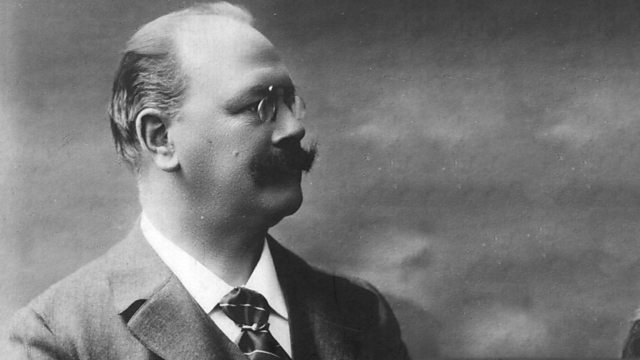
Episode 2
Joseph Middleton (piano) and Mary Bevan (soprano) perform songs by Duparc, Faure, Chabrier and Debussy at the Royal Conservatoire of Scotland in Glasgow.
Pianist Joseph Middleton and soprano Mary Bevan explore how poets inspired the songs of Duparc and his contemporaries. From the Royal Conservatoire of Scotland in Glasgow.
The name Henri Duparc is admitted into the great roll-call of French song composers on account of only 16 solo songs and a duet. Born in 1848, by the time he was 35 he had written the songs that were to ensure his musical immortality and, due to an obscure nervous disease, he wrote no more until he died, aged 85, in 1933. Duparc's first song was written in 1868, a year before the death of Berlioz; his last in 1884, a year after the death of Wagner. He destroyed many compositions, such was his perfectionist nature. This series seeks to place Duparc's solo songs in the wider context of his friends, influences and contemporaries, thus highlighting his remarkable gift for setting poetry for voice and piano.
Today's recital in this series looks to poets for inspiration. For Duparc, one poet marks a special relationship, the result of which are two masterpieces that distinguish a compositional style which seems entirely idiosyncratic. His songs L'invitation au voyage and La vie ant茅rieure are both settings of Charles Baudelaire (1821-1867) and these two songs represent his greatest achievements as a song composer.
Other fine settings of Baudelaire in today's recital include Les hiboux by D茅odat de S茅verac (1872-1921) and Harmonie du soir by Pierre de Br茅ville. Both composers, like Duparc, were students of C茅sar Franck. Two songs from Debussy's Cinq Po猫mes de Baudelaire complete our mini-tour of settings of this poet. The middle of the recital is dedicated to Goethe and the plight of the young waif Mignon, a heroine who has bewitched composers ever since her tale was told in Wilhelm Meisters Lehrjahre (1795-1796). Duparc sets Wilder's translation of Goethe's Kennst du das Land? in a simple strophic form. Juxtaposed with this song are four settings Schubert made exploring the ever-deteriorating mental state of this vulnerable girl. Just as Baudelaire unlocked Duparc's profound ability for setting poetry to music, so the same could be said for Goethe's influence upon a young Schubert.
DUPARC L'invitation au voyage
CHABRIER: L'invitation au voyage
FAURE Chant d'automne; Hymne
DUPARC Romance de Mignon
SCHUBERT Nur wer die sehnsucht kennt; Heiss mich nicht reden; So lasst mich scheinen; Kennst du das Land?
DE SEVERAC Les hiboux
DE BREVILLE Harmonie du soir
DEBUSSY Harmonie du soir
DUPARC La vie ant茅rieure.
Last on
More episodes
Previous
Music Played
-
![]()
Henri Duparc
L'invitation au voyage
Performer: Joseph Middleton. Singer: Mary Bevan. -
![]()
Emmanuel Chabrier
L'invitation au voyage
Performer: Joseph Middleton. Singer: Mary Bevan. -
![]()
Gabriel Faur茅
Chant d鈥檃utomne
Singer: Mary Bevan. Performer: Joseph Middleton. -
![]()
Gabriel Faur茅
Hymne
Performer: Joseph Middleton. Singer: Mary Bevan.- SIGNUM.
-
![]()
Henri Duparc
Romance de Mignon
Performer: Joseph Middleton. Singer: Mary Bevan. -
![]()
Franz Schubert
Heiss mich nicht reden
Performer: Joseph Middleton. Singer: Mary Bevan. -
![]()
Franz Schubert
Nur wer die sehnsucht kennt
Performer: Joseph Middleton. Singer: Mary Bevan. -
![]()
Franz Schubert
So Lasst mich scheinen
Performer: Joseph Middleton. Singer: Mary Bevan. -
![]()
Franz Schubert
Kennst du das Land?
Performer: Joseph Middleton. Singer: Mary Bevan. -
![]()
D茅odat de S茅verac
Les hiboux
Singer: Mary Bevan. Performer: Joseph Middleton.- Voyages.
- SIGNUM.
- 10.
-
![]()
Pierre de Br茅ville
Harmonie du soir
Performer: Joseph Middleton. Singer: Mary Bevan. -
![]()
Claude Debussy
Harmonie du soir
Performer: Joseph Middleton. Singer: Mary Bevan. -
![]()
Henri Duparc
La vie ant茅rieure
Performer: Joseph Middleton. Singer: Mary Bevan.
Broadcast
- Wed 1 Apr 2015 13:00成人快手 Radio 3

